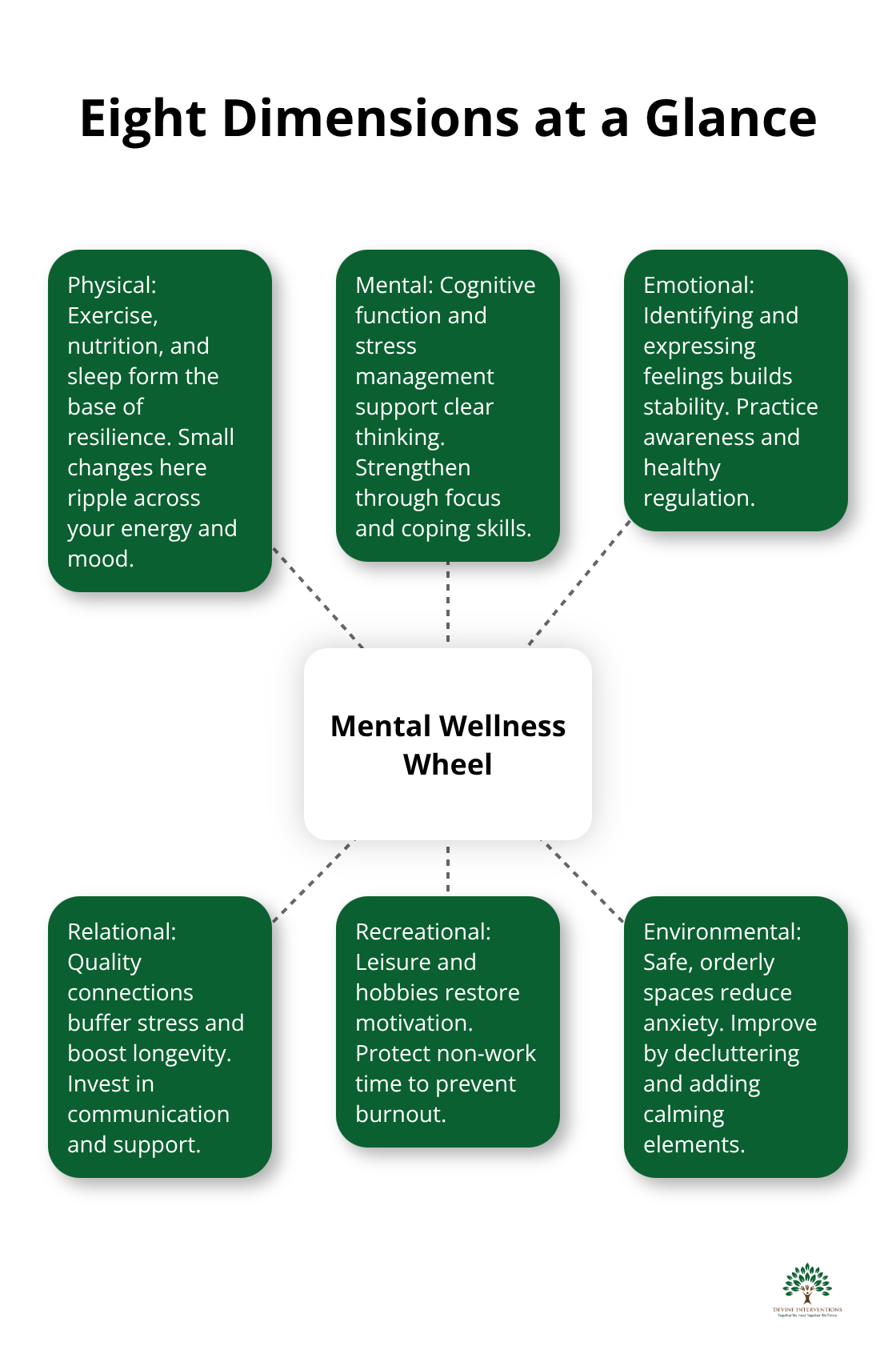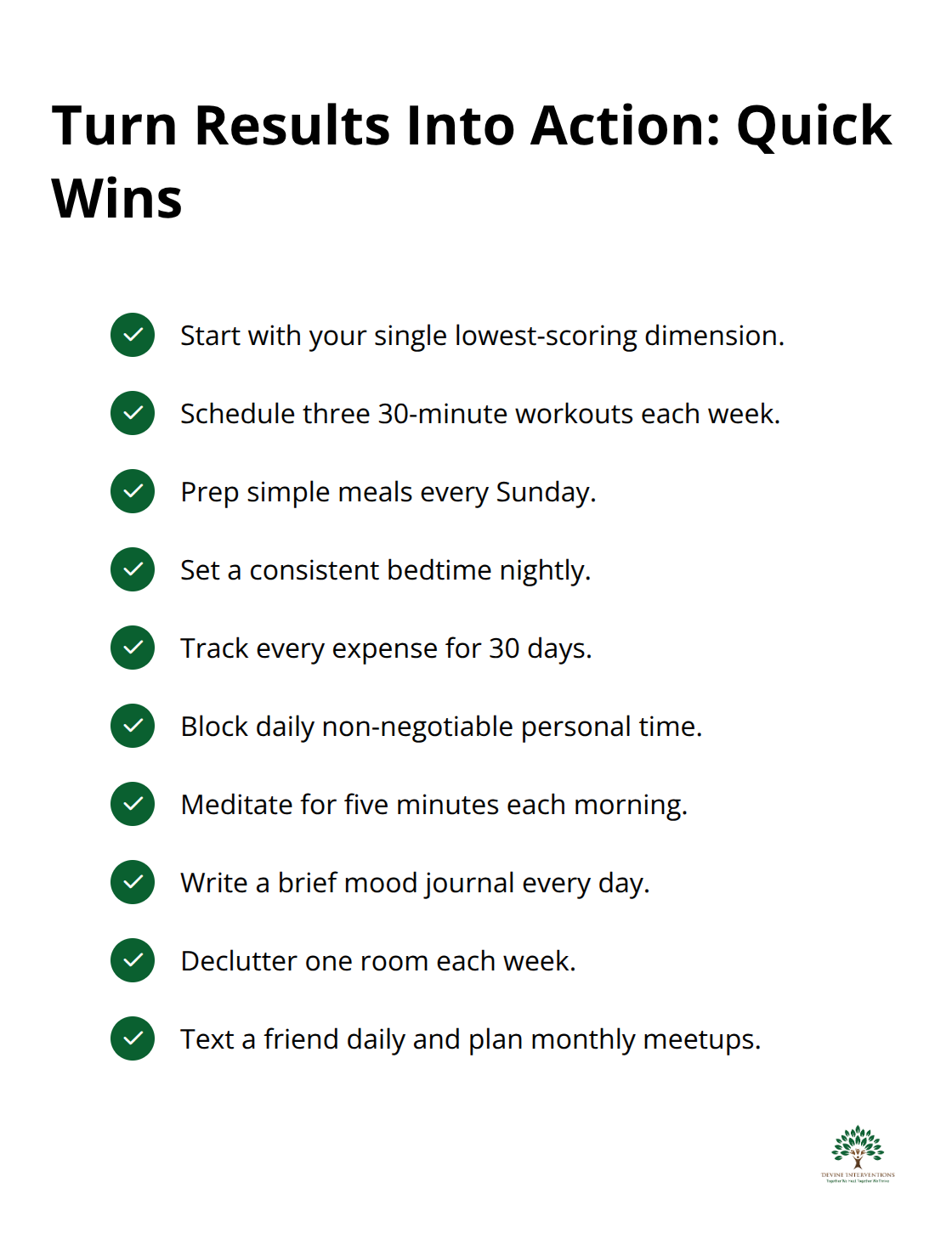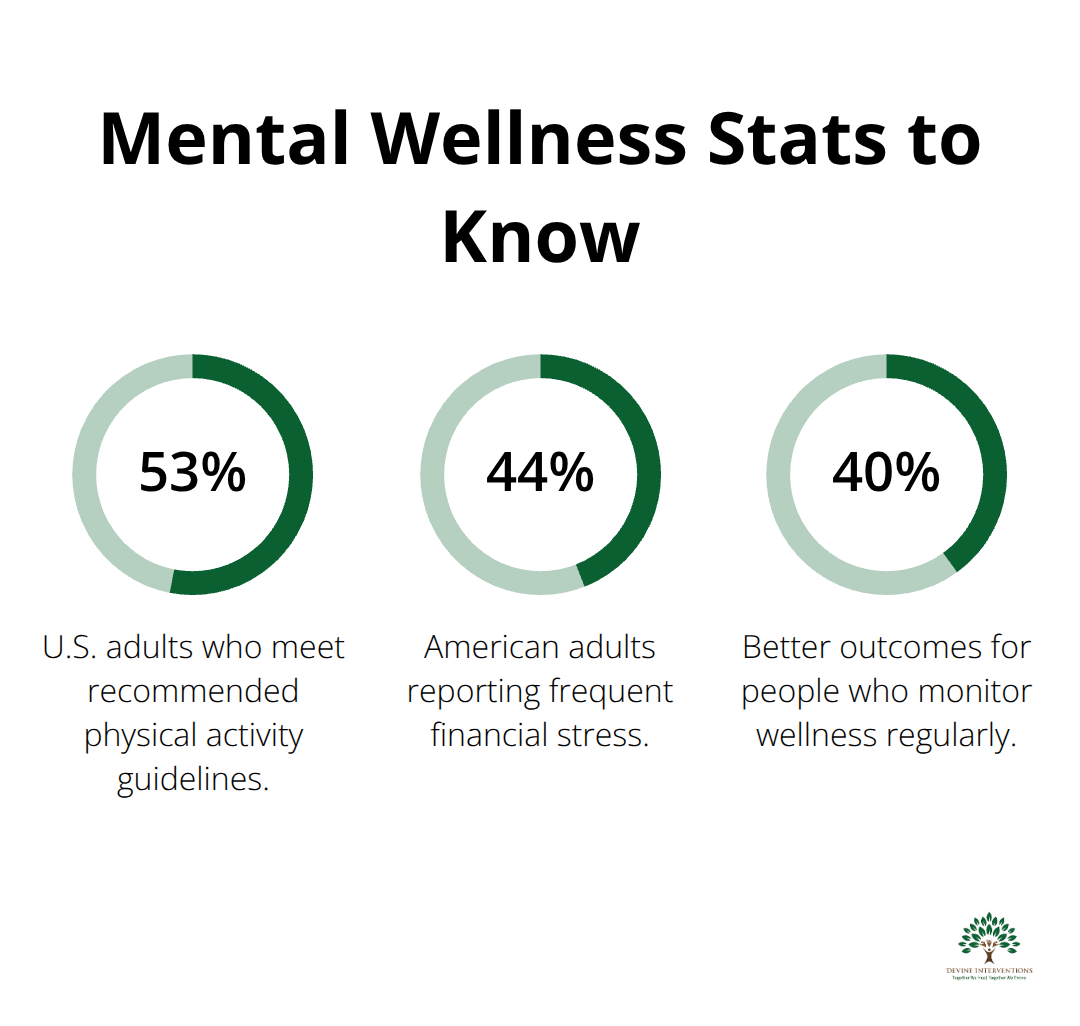Life balance affects every aspect of your mental health, yet many people struggle to identify which areas need attention.
Our Mental Wellness Wheel Quiz helps you assess eight key dimensions of wellbeing and pinpoint where imbalances might be impacting your daily life. We at Devine Interventions created this assessment to give you clear insights into your current wellness state and practical steps forward.
Understanding the Mental Wellness Wheel
Eight Core Dimensions of Mental Wellness
The Mental Wellness Wheel divides your wellbeing into eight interconnected dimensions: Physical, Mental, Emotional, Relational, Recreational, Environmental, Spiritual, and Financial. Each dimension directly affects your overall mental health, and weakness in one area creates ripple effects throughout your entire system.
Physical wellness encompasses exercise, nutrition, and sleep. The CDC reports that only 53% of adults meet recommended physical activity guidelines, yet regular exercise reduces depression symptoms significantly. Mental wellness involves cognitive function and stress management, while emotional wellness centers on your ability to identify and express feelings effectively.
Daily Signs of Imbalance
When these dimensions fall out of balance, specific warning signs emerge that most people ignore until problems become severe. Financial stress affects 44% of American adults who report frequent stress (directly impacting sleep quality and relationship satisfaction). Poor occupational wellness appears when job dissatisfaction becomes prevalent, which leads to burnout and mental health deterioration.

Environmental wellness suffers when your spaces feel chaotic or unsafe, creating constant low-level anxiety that drains mental energy. Relational wellness breaks down when social connections weaken – research by the Florida Psychological Association links strong relationships to longer, healthier lives.
The Domino Effect Between Dimensions
One dimension inevitably damages others through predictable patterns. Sleep deprivation affects over one-third of adults according to health data, which then impairs cognitive function, emotional regulation, and physical recovery. Similarly, weak spiritual wellness leaves you without purpose and values, making you more vulnerable to anxiety and depression.
The American Psychological Association’s 2024 Work in America survey found that one in three workers lack sufficient flexibility for work-life balance. This occupational imbalance destroys recreational and relational wellness simultaneously, creating a cascade of mental health challenges.
Now that you understand how these eight dimensions interact and influence each other, you can begin to assess where your own wellness stands through our comprehensive evaluation tool.
Take the Mental Wellness Assessment
Complete Your Assessment in Minutes
Rate each wellness dimension from 1 to 10, where 1 represents significant struggle and 10 indicates optimal function. Physical wellness: How satisfied do you feel with your exercise routine, sleep quality, and nutrition habits? Mental wellness: Rate your ability to manage stress, focus clearly, and maintain cognitive sharpness throughout the day. Emotional wellness: Assess how well you identify your feelings, cope with difficult emotions, and maintain emotional stability. Relational wellness: Evaluate the quality of your connections with family, friends, and colleagues, plus your sense of social support.
Recreational wellness: Consider your satisfaction with hobbies, leisure activities, and work-life balance. Environmental wellness: Rate how comfortable and safe you feel in your spaces (both living and working environments). Spiritual wellness: Assess your sense of purpose, personal values alignment, and meaning in life. Financial wellness: Evaluate your financial security, budget effectiveness, and money-related stress levels.
Your Results Reveal Important Patterns
Scores below 6 in any dimension signal areas that require immediate attention, as these directly impact your mental health stability. The American Psychological Association research shows that multiple low scores create compound stress effects that accelerate mental health deterioration. Scores between 6-8 indicate moderate function with room for targeted improvement, while scores above 8 suggest strong wellness in those areas.
Pay special attention to your three lowest scores – these represent your wellness priorities. Research demonstrates that focus on your weakest areas produces the most significant overall improvement. Calculate your total score when you add all eight ratings. Scores below 48 indicate widespread imbalance that requires comprehensive intervention, while scores above 64 suggest generally stable wellness with specific areas that need refinement.

Transform Your Assessment Into Action
Your lowest scores identify exactly where to invest your energy for maximum mental health improvement. Swedish healthcare worker studies prove that attention to even one dimension significantly improves overall wellbeing within weeks. Start with your single lowest score – this creates the foundation for broader wellness improvements across all dimensions.
Once you identify your priority areas through this assessment, you can develop targeted strategies to strengthen these weak points and build sustainable wellness habits.
Strategies to Improve Your Wellness Balance
Start With Your Lowest Score First
Your assessment results pinpoint exactly where to focus your energy for maximum mental health improvement. Target your single lowest-scoring dimension immediately – this creates the foundation for broader wellness gains across all areas. Research shows that workplace wellness initiatives can provide significant benefits, with 62% of employees wanting more mental health resources from their employer.
Physical wellness improvements begin with three 30-minute exercise sessions weekly, meal plans you prepare on Sundays, and a consistent bedtime you maintain nightly. Financial wellness requires a monthly budget spreadsheet and expense tracking for 30 days to identify your spending patterns. The Harris Poll found that 60% of Americans struggle to disconnect from work, which makes recreational wellness improvements essential through non-negotiable personal time you schedule daily.
Build Micro-Habits That Stack Together
Transform your wellness through small, consistent actions that compound over time rather than dramatic lifestyle overhauls that fail within weeks. Mental wellness improves through five-minute morning meditation sessions (apps like Headspace work well), while emotional wellness strengthens through daily mood journals that help you recognize patterns.
Environmental wellness advances when you declutter one room weekly and add plants to your workspace. Relational wellness grows when you text one friend daily and schedule monthly face-to-face social activities. Spiritual wellness develops as you identify your core values and spend 10 minutes weekly reflecting on meaningful activities.
Use Time Management Techniques That Work
The Pomodoro Technique enhances productivity while supporting work-life balance – work for 25-minute focused blocks followed by five-minute breaks. Research on organizational resources shows how managers can better support employees with mental health challenges through structured approaches.
Group similar tasks together and schedule focused time blocks to reduce decision fatigue throughout your day. Take regular breaks, including micro-breaks every 1-2 hours, which research proves boost productivity and focus significantly.
Know When Professional Support Becomes Necessary
Seek professional intervention when your total wellness score falls below 48 or when three or more dimensions score below 6. Mental health professionals provide targeted strategies that self-help approaches cannot match, particularly for trauma, addiction, or severe depression.
Professional support becomes essential when wellness imbalances persist despite consistent self-improvement efforts for 90 days or when symptoms interfere with work performance and relationships. Comprehensive assessment and personalized treatment plans address multiple dimensions simultaneously for faster, more sustainable results.
Final Thoughts
Your Mental Wellness Wheel Quiz results provide a snapshot of your current life balance, but wellness requires ongoing attention and regular assessment. Mental health changes with life circumstances, stress levels, and personal growth. Quarterly check-ins with this assessment tool maintain optimal wellbeing.
Schedule monthly reviews of your lowest-scoring dimensions and track improvements through consistent measurement. Research shows that individuals who monitor their wellness regularly experience 40% better outcomes than those who assess sporadically. Set calendar reminders to retake this mental wellness wheel quiz every three months or after major life changes (job transitions, relationship shifts, or health challenges).

Sustainable wellness habits take time and often benefit from professional guidance. We at Devine Interventions provide mental health support through therapy and treatment programs that address multiple wellness dimensions. Your wellness journey starts with awareness through assessment and continues with targeted action in weak areas.







